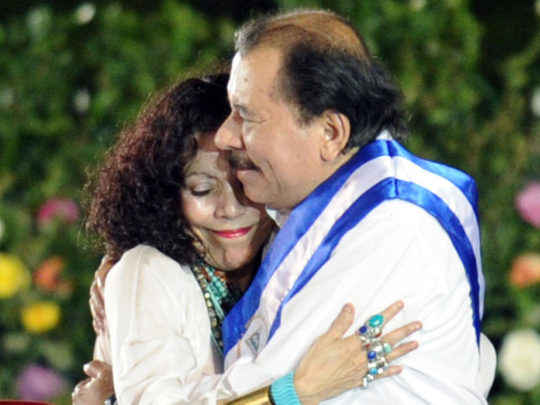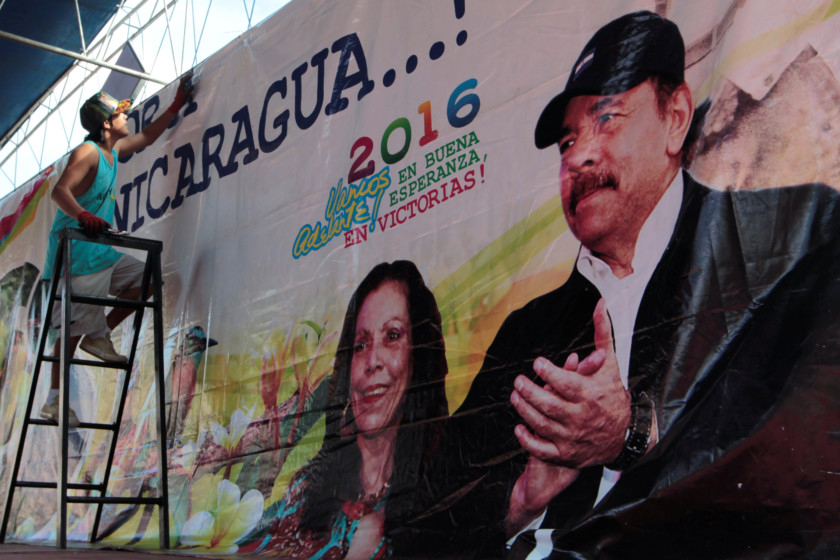
Nicaragua: She started out as a teenage mother working as a newspaper secretary, then spent decades dealing with revolution, conflict, power and public scandal at the side of one of the region’s most influential men.
Now the First Lady of Nicaragua, Rosario Murillo, has succeeded in doing something that seems more like a plotline out of the Netflix series House of Cards: She will be on the Sunday ballot to become vice-president.
Her running mate? Her husband, President Daniel Ortega.
The election, in which the couple’s victory and Ortega’s third consecutive term are all but certain, is a critical step in what people around Murillo describe as her decades-long climb to power. She paved the way by helping the poor and winning over the public, but also by holding political grudges and pushing aside nearly all the members of her husband’s inner circle.
“Denying something to my mother is a declaration of war,” her daughter ZoilamErica Ortega said.
But in many ways, the First Lady’s spot on the presidential ticket is an acknowledgement of the role she already plays in the country.
“She’s not the vice-president; she’s the co-president,” said Agustin Jarquin, who ran for vice-president on Ortega’s ticket in 2001 but was kicked out of the National Assembly without notice once he fell from favour.
Involved
Murillo, 65, is already a de facto Cabinet member, deeply involved in every aspect of the government. She is the one who gives daily news briefings about the latest earthquake or damage from an industrial fire. If a child has Zika, Murillo knows the boy’s name and might just call the parents herself. She meets regularly with municipal leaders and makes it clear that decisions cannot be made without her approval.
“It’s not that she has as many followers as her husband — she has more,” said Florencia del Carmen Lopez, 48, a street vendor. “The men are annoyed by it. The majority of her followers are women.”
As Murillo gained more control in the country, the government was widely criticised for taking bolder steps to secure Ortega’s power, raising troubling questions about the state of Nicaragua’s young democracy.
Nicaragua is a country where a revolution deposed one family dynasty, only to see it at risk of being replaced by another. Ortega, the president, is a 70-year-old former guerrilla who played a leading role in the Sandinista revolution that toppled Anastasio Somoza Debayle, the dictator whose family ruled here from the 1930s to 1979.
Now the Ortegas and their allies control fuel companies, television stations and public construction projects. At the helm is Murillo, who has a penchant for hard work that amazes even her opponents. She has made it her business to overhaul everything, from the nation’s parks to her husband’s image.
Slow move to power
“There were signals: Little by little, her face started showing up as the face on the political propaganda, at first with Daniel and then alone,” said Sergio Ramirez, who was Ortega’s vice-president in the 1980s. “Now it seems she is looking for political legitimacy. This is an extreme search for legitimacy.”
Her relationship with Ortega began in the cauldron of war. He spent part of the Sandinista revolution underground in Costa Rica, where he became romantically involved with Murillo. By then, she had two children, and she was raising them in a clandestine safe house filled with copy machines, short wave radios and people who assumed false names. Ortega went by “Enrique.”
ZoilamErica Ortega, Murillo’s oldest child, was adopted by Ortega in her late teens. She recalled those early years as chaotic, describing a busy office with people traipsing in and out.
“Nobody took care of us, literally nobody,” she said in an interview. ZoilamErica Ortega, now 48, publicly accused Daniel Ortega of sexually abusing her for years. She said he had taken advantage of the supervision vacuum of that period and had begun molesting her around the time that the Sandinista revolutionaries claimed victory. She was 11.
She went public with rape accusations in 1998. But her mother, who has had seven children with Daniel Ortega as well, stood by him.
Joined by Ortega and their adult children, Murillo held a news conference calling her eldest daughter a liar who suffered from psychological problems.
Although at least one witness backed up the abuse allegations, a legal case against Daniel Ortega collapsed in the courts, which are controlled by the Sandinista party.
In trouble for talking
ZoilamErica Ortega said she had suffered retribution for going public, contending that the non-profit organisation she ran was routinely cut off from funding sources that feared losing favour with the government. Three years ago, the government deported ZoilamErica Ortega’s Bolivian husband, so she was forced to leave Nicaragua. They now live in neighbouring Costa Rica.
“I speak to her only to receive threats,” ZoilamErica Ortega said of her mother. “She opted for an alliance of power.”
Now some Nicaraguans are worried that even more power will be consolidated in the Ortega family. “She wants to continue having power — that’s a sickness,” said Sergio Gonzalez Gutierrez, 42, a taxi driver, in San Jose Oriental, Murillo’s old neighbourhood. “If a private company does not allow a married couple to work together, how is that allowed for a nation?”
The government contends that the Nicaraguan Constitution prohibits only blood relatives from being on the same ticket. But many political analysts say the couple is violating the part that also excludes people who are related “by affinity.” “This is a movie we already saw, and we know how it ends,” said Ramirez. “It ends badly.”
—New York Times News Service












